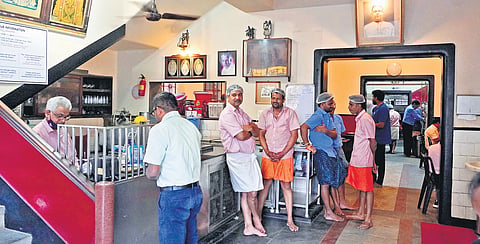

BENGALURU : From the outside, it’s an unassuming decades-old two-storey building that is tucked between modern structures. Combined with its spartan and old-fashioned decor on the inside, the Mavalli Tiffin Rooms(MTR), on Lal Bagh Road seems like a piece of old Bangalore frozen in time. Yet, as those who have patronised the iconic restaurant know, the understated exterior belies a sensory experience within. The aroma of freshly baked rava idlis, authentic filter coffee, and the iconic masala dosa wafting from the kitchen – positioned right and centre to increase the patrons’ confidence in the quality of the food – will instantly heighten one’s appetite.
This year, the charming restaurant is celebrating 100 years since its inception. From its humble beginnings in 1924 to its status as a gastronomical icon today, MTR, over the past century, has come to represent authentic vegetarian South Indian cuisine. “One of the first things that most people who come here do is visit MTR. But the allure of the restaurant is not just food, even though it plays a significant role. It’s also the decades of history that the restaurant has. It has a different vibe to it, unlike anything that the city has now. In a sense it’s also a piece of history,” says Hemamalini Maiya, a third-generation restaurateur and managing partner of MTR.
Founded by three brothers, who had arrived in Bengaluru from a small village in Udupi, seeking a better future, MTR, in its original form, was perhaps the first drive-through restaurant in the world. “It was a small joint that would serve coffee and basic snacks. But because the place was so small, people would park their cars in front and they would be served in their cars,” says Hemamalini. But it was the arrival of Yagnanaryana Maiya, the youngest brother, that took MTR to greater heights. “In 1951, he travelled to Europe and decided to study how restaurants there functioned – the hygiene standards, the service and presentation, and so on – all of which he incorporated into the new restaurant – at the current location on Lal Bagh Road, which came into existence in 1960,” she adds.
From the famous story of the invention of rava idli during World War II to pivoting to instant mixes during the Emergency in the mid-’70s, MTR’s history is replete with instances of innovation in the face of adversity. But for managing partner Vikram Maiya, one of the biggest strengths of the restaurant, which has allowed it to not only survive the test of time but to actively thrive, has been its consistency.
“Being good is one thing, but being consistently good is a different ball game altogether. We don’t approach it as something that we own and can do whatever we want, but rather as caretakers of a legacy,” he shares, adding, “I’ve been doing this for nearly 23 years, while Hemamalini has been doing it for even longer. And when you do this day in and day out, it’s easy to lose track of time. For lack of a better word, it hasn’t sunk in. But I’m immensely proud of what we have achieved, taking care of the brand and taking it to new heights.”
Invention of the rava Idli
During World War II, when rice was in short supply, MTR introduced the now iconic rava idli, a twist on the classic idli, using semolina instead of rice. This dish not only addressed the crisis but also became a staple in South Indian cuisine.
The Emergency and Unexpected Diversification
In 1975, when the Food Control Act mandated low prices for food items, MTR faced a crippling loss, even as it enjoyed increased popularity. Within weeks, the restaurant closed while the family decided to diversify and started selling masala and instant mixes from a building next door. The restaurant subsequently reopened in 1981. In 2007, the packaged foods business was acquired by a Norwegian conglomerate for $80million.
Going global
Following its first expansion outside of the original location in Rajajinagar in 2004, MTR opened its first restaurant in Singapore in 2013. Currently, there are restaurants in London, Singapore, Malaysia, Dubai, including the most recent one in Seattle, USA.